For International Literacy Day on Sept. 8, I’m remembering some amazing kids who haven’t had the educational opportunities I’ve had. Traveling to low- and middle-income countries as a writer with Compassion, I’ve met children who are out of school and in the streets, their parents unable to afford school tuition, uniforms, supplies and transportation. Other kids I’ve met are enrolled in school, but their teachers are unreliable or under-educated.
Every child I meet deserves the same access to quality education. But they don’t all get it.
I want to tell you the stories of two girls I have met. The first is 10-year-old Halena in Indonesia, who reminds me of education’s power to end generational poverty.
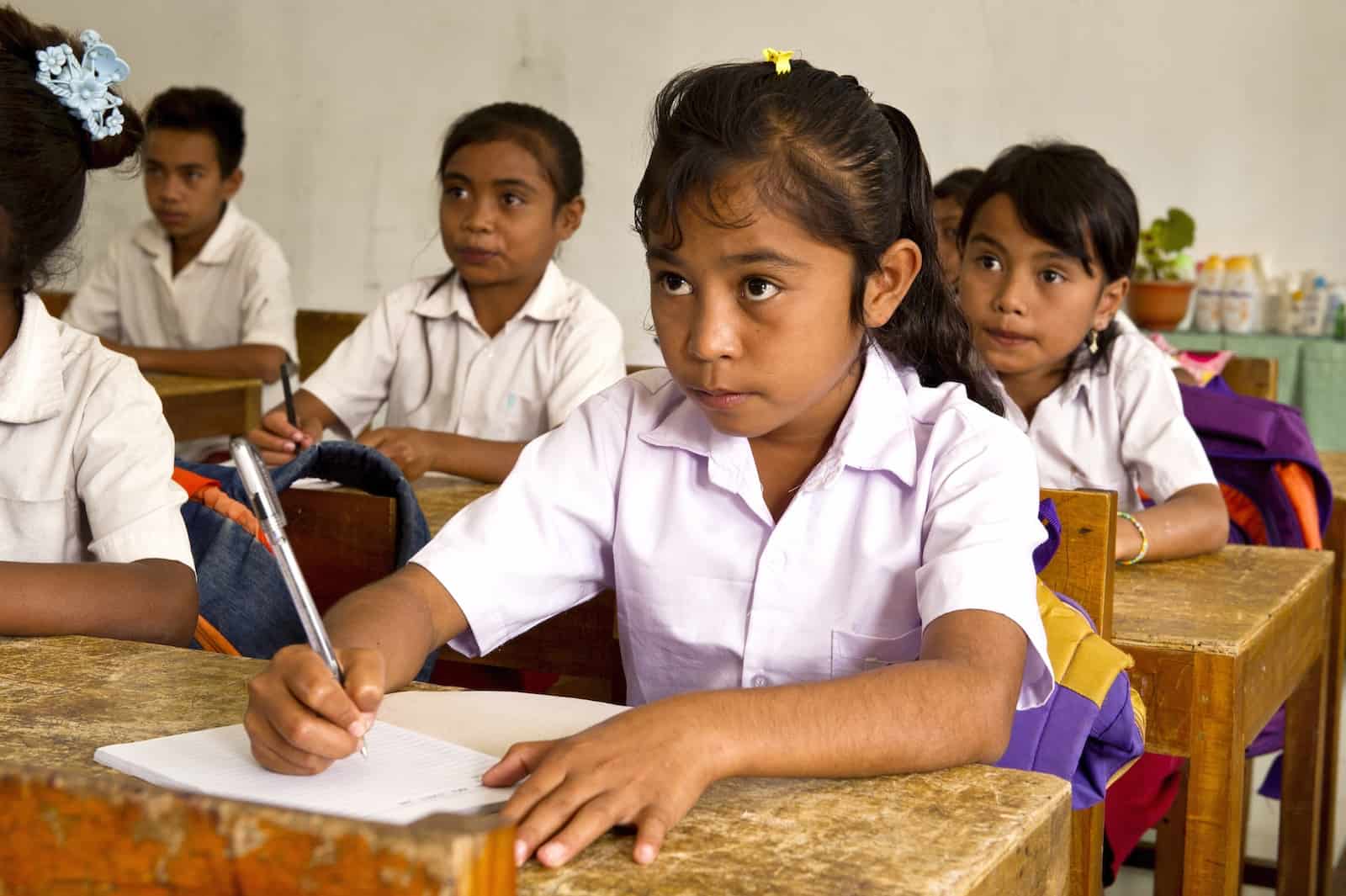
Halena lives on a remote island called Sumba, where her parents work as subsistence farmers. Her dad, Fransiskus, and mom, Marta, earn about $45 a month selling the produce they grow. Although the family usually has food to eat, there’s not enough money for medicine, transportation, clothing — or education.
Like many adults on Sumba, Marta and Fransiskus are not literate. When they were growing up, the most important education they could get was learning from their parents how to grow crops. As Indonesia developed and began to invest in its school system, the culture shifted. Now, most Indonesian kids finish primary school.
I visited Halena’s public school and looked in on classrooms of children in red-and-white uniforms, raising their hands and writing in workbooks. It struck me that I was seeing something big: the first generation on this island to get a formal education.
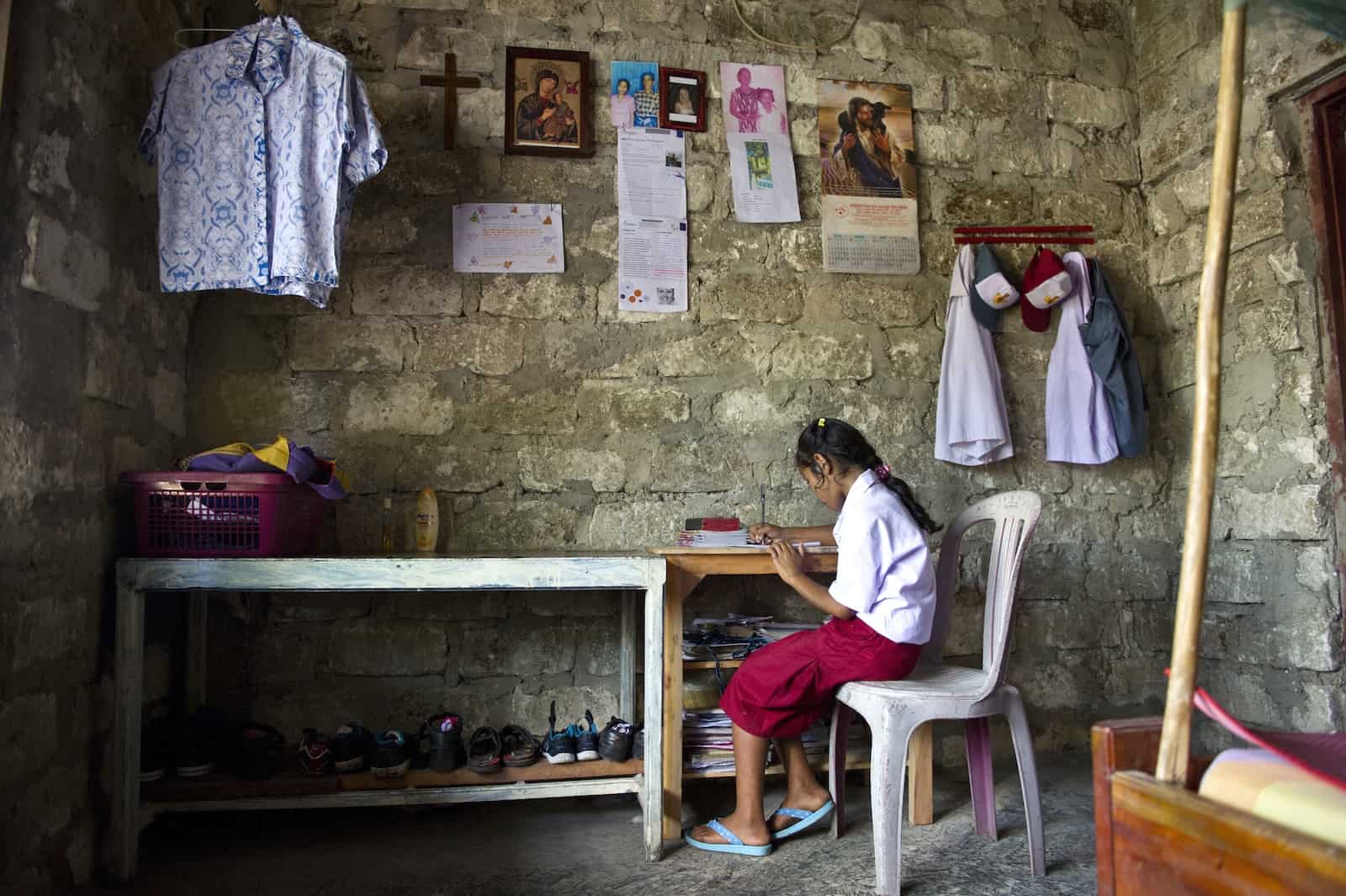
Watching Halena do homework later that day at a desk in her bedroom, I thought of how I take my own literacy for granted back in Colorado. But spending time with Halena’s parents reminded me that not everyone has equal opportunity to education.
“We cannot read or write,” Marta told me. “But seeing my children able to write and read — that has made our hearts feel joy.”
Literacy and Multilingualism
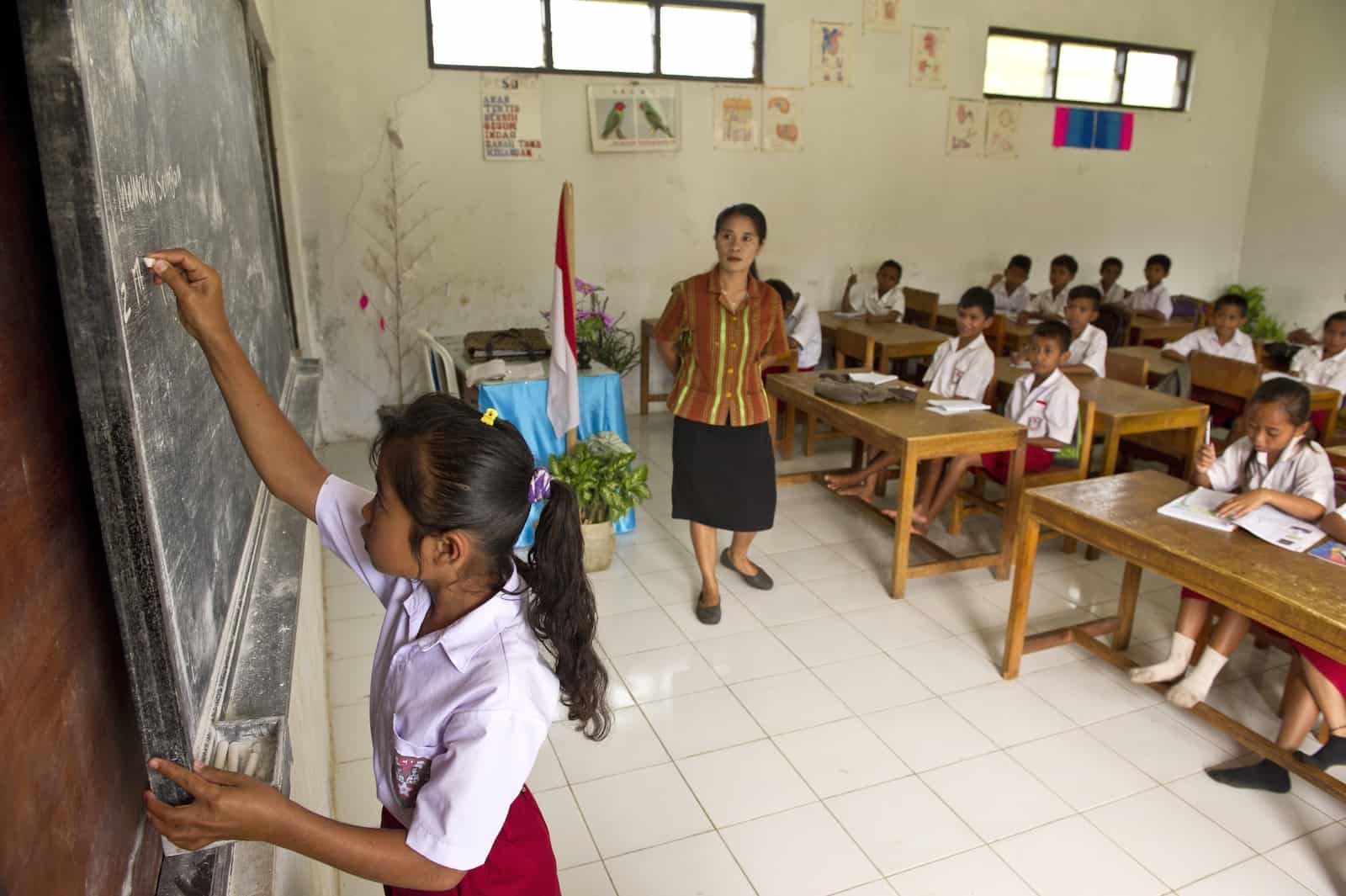
Another cool thing I noticed about Halena’s education: She knows more than one language. She spoke Indonesian, the most common language in her country, the indigenous language of her parents, and also some English.
As the workforce gets more digital and globalized, knowing more than one language is more important than ever. Because of this, UNESCO chose “literacy and multilingualism” as its theme for International Literacy Day 2019. Students preparing to join a competitive workforce as adults will have a big advantage if they speak more than one language. Employers will be looking for multilingual workers to help them grow in the global marketplace.
Teaching language skills to children prepares them to find jobs as adults that pay well and are fulfilling. They will have choices their parents never had. Halena will be able to decide whether to be a farmer like her parents or to choose another profession. The language skills she’s learning at school and her Compassion center give her even more choices.
The Bigger Story: International Literacy Day Global Report Card
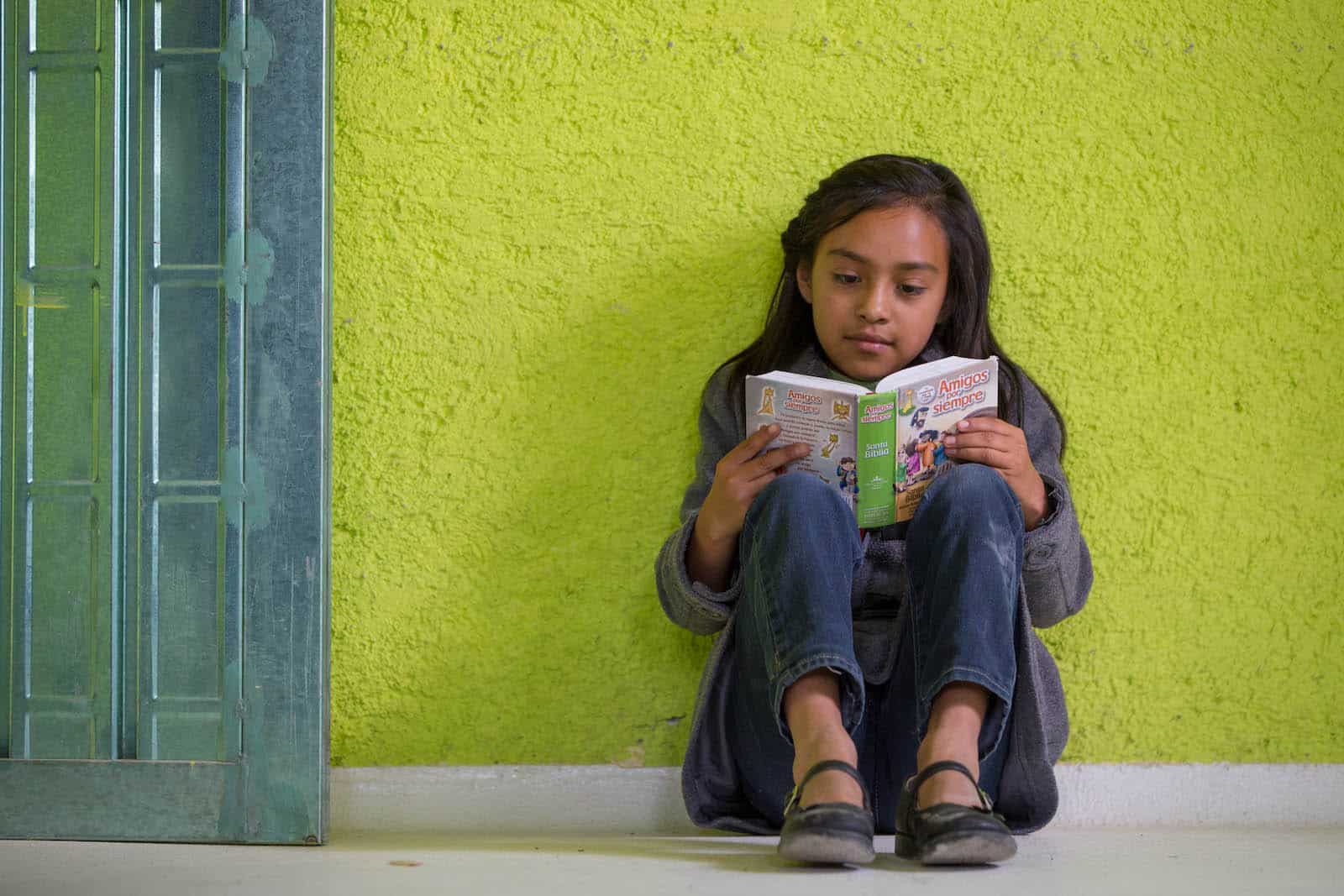
I’ve seen on an individual level how literacy and education impact children living in poverty. But what’s the story on a bigger level?
In 2015, members of the United Nations General Assembly adopted 17 Sustainable Development Goals, which they would reach by 2030. The fourth goal: Ensure inclusive and equitable quality education and promote lifelong learning opportunities for all. To find out whether the world is on track to meet that goal, UNESCO looked at indicators like out-of-school rates, skills for work, early childhood learning and school-completion rates. The 2019 report found that the world is behind in its commitments.
We are only a third of the way toward meeting the deadline.
“This is the year that the generation of students that should finish secondary school by 2030 should be entering school for the first time,” the report says. “Yet, in low-income countries, only 60% of children complete primary school, while in some regions the percentage of students who achieve minimum proficiency in reading is even falling.”
I saw the face of those stats in the second girl I want to introduce you to today.
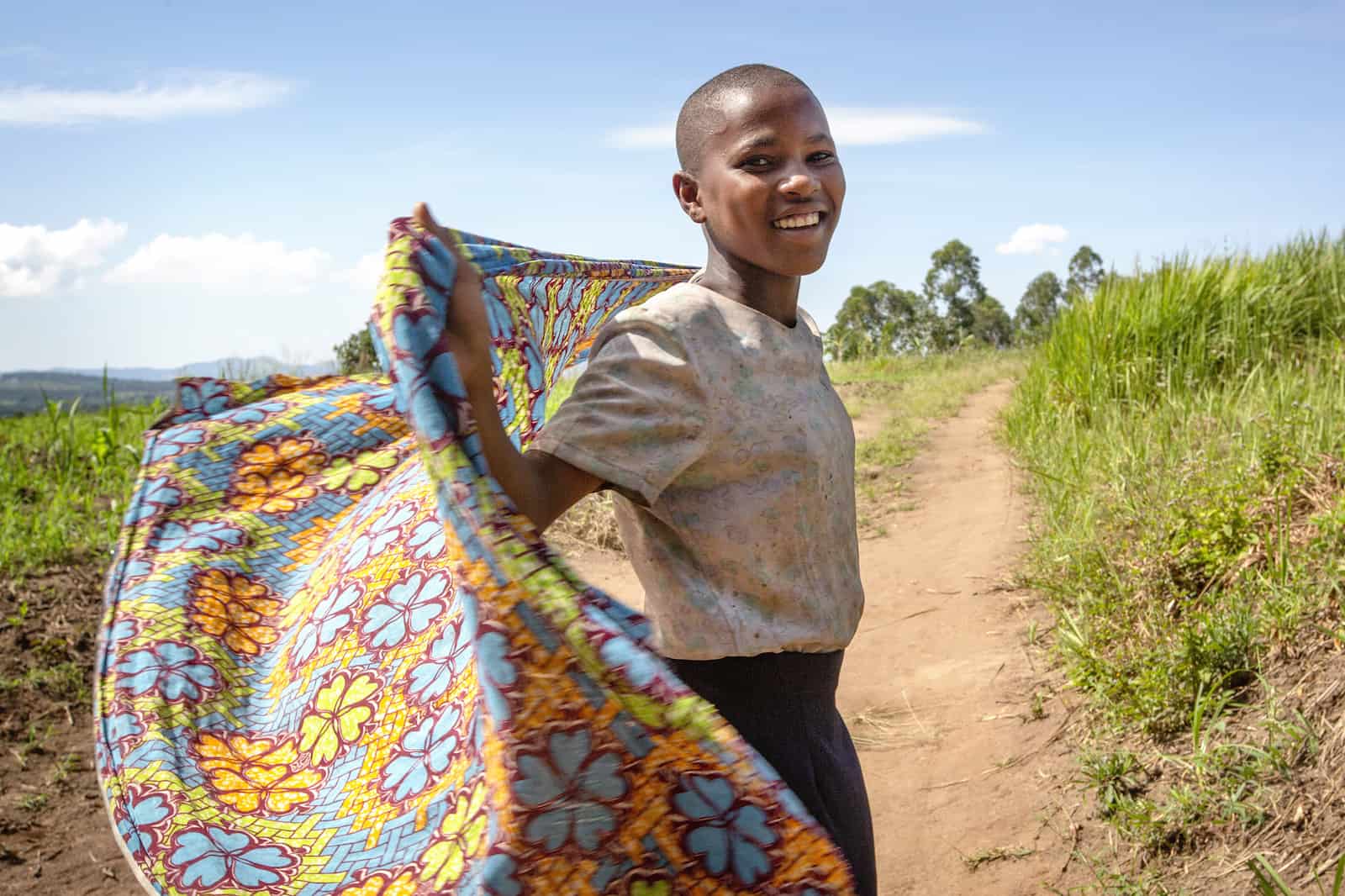
I visited Uganda this year to meet families whose lives had been changed by people who gave through Compassion’s Gift Catalog. While visiting a home in a dry, remote village, I walked over to meet a girl who’d been watching us curiously from the dirt road. She was holding a blue workbook with her name written on the front. With the help of a translator, I found out she was 12 and not in Compassion’s program (the one in her village was at capacity). The photographer I was with snapped this beautiful picture of her.
I asked why she wasn’t in school on a weekday. She said the teacher had sent her home because she couldn’t pay the school fee.
Her heartbreaking story made it clear we have more work to do if we believe that every child deserves access to a quality education.
Literacy Is a Human Right
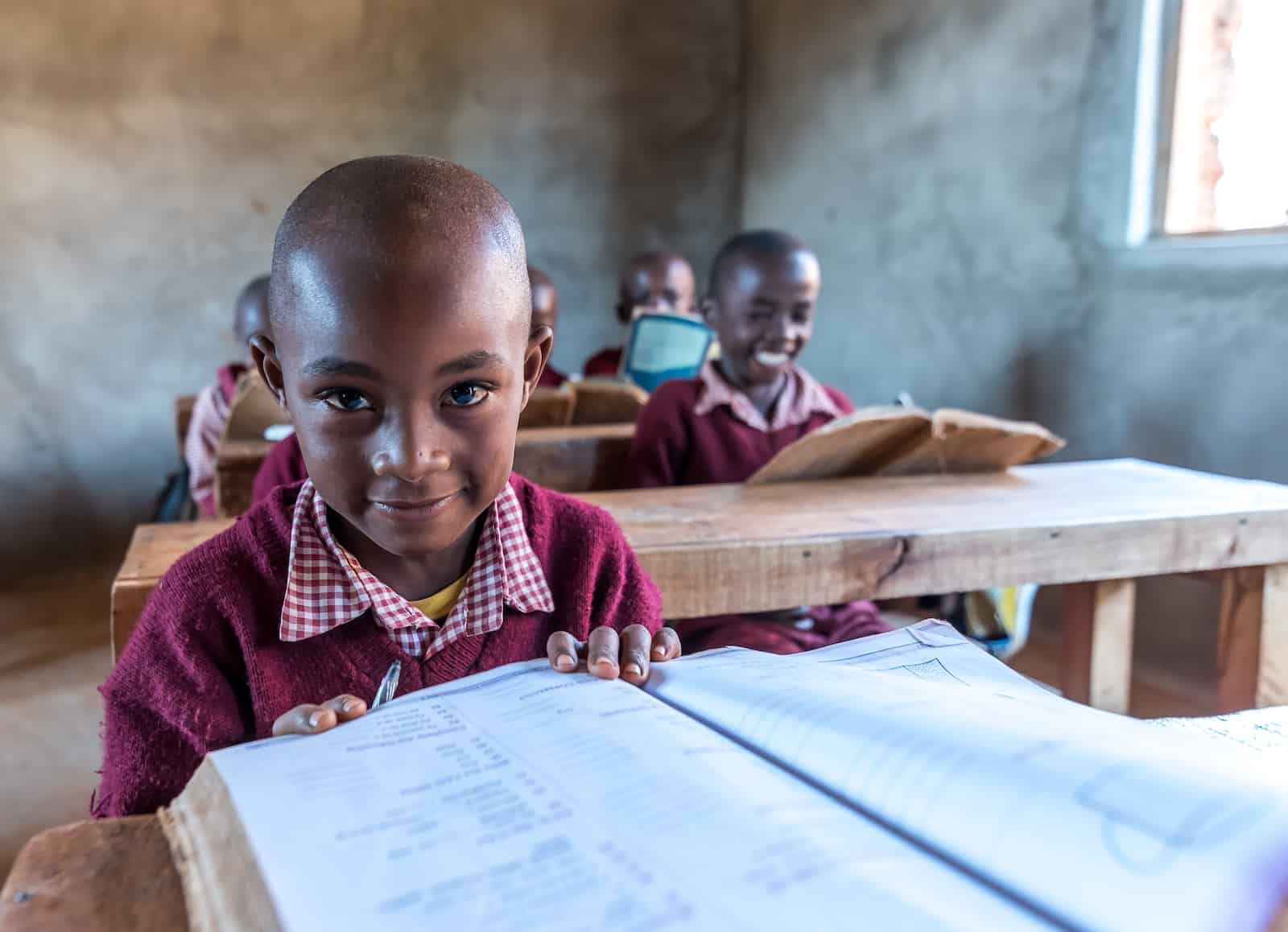
This International Literacy Day, I feel so much hope for Halena in Indonesia and all the sponsored kids around the world. Sponsorship through Compassion is giving them the invaluable chance to get an education and excel at school. Learning to read and write — especially in more than one language — prepares them to be self-sufficient adults able to support their families and teach their children to read.
But on International Literacy Day I’ll also remember the girl I met in Uganda — and the 262 million kids around the world who are out of school, according to UNESCO. If you’re interested in joining the fight for their right to education, you can learn more here.
“Literacy is a bridge from misery to hope,” said Kofi Annan, former U.N. Secretary-General. “It is a tool for daily life in modern society. It is a bulwark against poverty. … For everyone, everywhere, literacy is, along with education in general, a basic human right.”
Photos by Chuck Bigger, Daron Short and Craig Thompson.

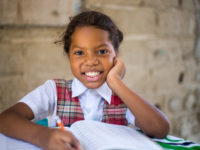

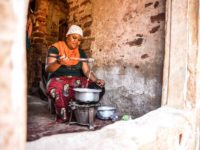
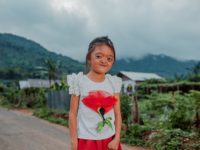


22 Comments |Add a comment
Growing up in an upper-middle class family in the United States definitely had its benefits. However, it also led me to live a pretty sheltered life when it comes to what others consider “normal.” As an elementary and middle school student, I never would have thought that my school experience wasn’t the exact same as people in any other part of the country or the world. In high school, I went on my first domestic mission trip and learned that I was wrong. We visited a small town in Mississippi that had a school that was run down, textbooks that were falling apart, playgrounds that were old, and recess equipment that was not able to be played with. We spent the week helping “spruce up” the school. We cleaned, painted, planted flowers out, and other thing for school beautification. We raised money before the trip for school supplies and new recess equipment. This was my first look into a community significantly different that my own. It opened my eyes and my heart to want to help.
My junior and senior year of high school and through my four years of college, I was able to go on mission trips to Honduras, Ecuador, and Nicaragua. My first trip to Honduras opened my eyes even more than that trip to Mississippi. The village we visited had an outdoor school, which meant on days that it rained or stormed, there was no school. This was mind-blowing to me at the time. In a nearby village there was a school that was essentially a pavilion, which meant that they could still go to school even when the weather was bad. This was considered to be a more “wealthy” area and the people who lived here were considered to be more privileged. It means so much to these families for their children to get an education and it made me realize for the first time how much I took advantage of the education I was getting.
Oh how much we take for granted in this beautiful place we call ours in America. I cannot imagine a world where I would be sent home because I could not afford to pay for my day at school. The fact that she is 12 and even wanted to be at school at all and could not. I wonder how many students here in America would love to miss a day of the very thing that we take for granted because it is a right in our country. It is a right. And people around the world are having to pay for the privilege. I did enjoy the positive spin on the first story. The little girl will have more options than her parents did because she has been able to have access to education. I think about some of the students at my school. I teach at a very low-income school. Very few students at my school would be able to afford to come to school if they had to pay out of pocket for the privilege. Of course, that doesn’t ensure that they won’t fall into the same trap of generational poverty, but it sure does give them a helping hand if they are willing to reach for it. It is heartbreaking to see the stories of girls who want an education but cannot get it. And for such a reason as poverty. Obviously, I cannot solve the problem with my indignance, but it does give me cause for reflection and appreciation for the amazing opportunities that are afforded our students here, even in the poorest of schools.
Thank you for sharing these unique stories with us in such a positive way. I am certain that it would be easy to share what all goes wrong in these girls’ lives but instead they, and you, decided to share just how much they do enjoy the education that they can get when they can get it. It makes me cringe when I think of hearing students in our school saying that they hate coming to school or they want to quit. There are kids in the world that would love nothing more than to have their chair. I think that we all have such a warped idea on what poverty and lack of education looks like in other places in the world because of what we see on television and social media. The stories that you shared are absolutely unimaginable to me as someone who grew up in America in a middle class family. I was afforded the opportunity for an education that didn’t end early because I needed to help my family farm or because we could no longer afford to pay for school. A free education is a right in America but not everywhere. However, from the stories you shared these families did value the education that their children were getting or had gotten before. They saw the benefits in their daughters learning hireable skills that could one day lead to jobs. I liked that it was mentioned more than once about how important it is to know multiple languages. I wish I had tried harder in school to learn a second language and not just pass a test each Friday. Catherine Compton-Lilly shares a lot of insight on things that parents of children in poverty are willing to do and share in order to help their children. I was glad to see that you showed their parents in the stories. Parents in poverty are not always there because of unmentional acts or foolish lifestyles. There are generations of people who were not students themselves and are just doing the best they can with what they have. I wish there was a perfect solution to what we as teachers could do to help all of our students who live in poverty. I am glad to see that there are programs being offered around the world to empower and educate both boys and girls.
Thank you for this article. I have not given enough thought to how fortunate I am to live in the United States where education is free to everyone regardless of income level. Being literate helps in many ways. It is not just about being able to read and write. Being literate can help break the cycle of poverty that many people, like the girls in this article, live in. When I read this article, I immediately remembered an article by Olivia Giovetti entitled 6 benefits of literacy in the fight against poverty (Giovetti, 2020). According to Giovetti, being literate helps to break the cycle of poverty insofar as it improves health, enables one to be a lifelong learner and thus to build skills, creates jobs, promotes gender equality, promotes democracy and peace, and builds self-esteem. All of these things are of course possible without literacy, but with it they are so much easier. These are all things I take for granted. If I’m sick, I can look up information online or find a phone number for a doctor. When I want to learn a new skill I can read instructions on how to do it. For example, I recently learned to crochet by reading about it, and my husband has been able to pursue a longtime dream of picking up falconry. We can continue to learn and do things because we are literate. Literacy means so much more than being able to read and write; it means having a quality of life that is almost impossible without it. Being able to learn to read and write is a fundamental human right, and so many people are denied this because they live in poverty. This needs to change. Thank you for writing this article to help bring awareness to this issue.
Giovetti, O. (2020). 6 benefits of literacy in the fight against poverty. Retrieved March 4, 2022 from https://www.concernusa.org/story/benefits-of-literacy-against-poverty/
I am overwhelmed with joy for the family in the first story. Halena’s mother and father show such pride towards their daughter. The quote from Marta “We cannot read or write but seeing my children able to read and write- that has made our hearts feel joy”, brought a thought to my brain. At the Title 1 school I teach, we have a high ELL population as well as many parents that are not able to read and write. With the knowledge my students gain on a daily basis, even in 1st grade, they are able to help their own parents learn a new language or become literate in the language they know. I love that Halena is part of the first generation to receive a formal education.
My heart breaks for the student from Uganda that was sent home because she could not pay a fee, meanwhile she sits and works in the workbook on her own. She wants to learn, and it is obvious that she puts in the work to educate herself. The idea that there are 262 million kids that do not go to school is astonishing. I am saddened that not all children are offered the same rights to education. I take so much for granted as a teacher in the United States. I do not live in poverty and I have the opportunity to not only have a “normal” 13 year type of schooling but I’ve also been given the opportunity to further my learning with my bachelors and masters degree. I am absolutely humbled by this article and it will stick with me every day when I walk into my classroom with my own students.
Ashley Gholston
Blog Post #5
The story of the first girl, 10-year-old Halena, filled me with pride for this little girl and her family. I believe the author said it best when she said, “It struck me that I was seeing something big: the first generation on this island to get a formal education.” How amazing is that? We are literally watching history being made and these children’s futures being changed right before our eyes. Not only are these students learning, but most of them are learning in their home tongue, as well as in English. That bilingual piece is going to be so important for their future and connecting with other parts of the world. “We cannot read or write but seeing my children able to read and write- that has made our hearts feel joy.” As a mom myself, this quote just makes my heart want to explode. The love and sacrifice that these parents are giving to their children is incredible As a parent, our goals are always to help our children have a better life and be more successful than we were.
While reading about the 12-year-old from Uganda, my heart was filled with so much sadness. This is a reality that is more common than not for many poverty-stricken communities. Being told to leave a classroom because her parents could not afford the tuition just broke my heart. “We collectively blame teachers, students, and families for educational failure while neglecting our shared societal obligation to children.” (Compton-Lilly & Delbridge, 2018) This statement holds so much truth as it our responsibility to provide our children with an education. Literacy should be a basic human right; unfortunately, in many cases it is not. We know as a society that being illiterate is directly related to poverty, and not access to an education only continues the cycle of poverty. While looking at how to improve poverty levels, education should be at the forethought of all of those conversations. How can we provide every child with a good education? How can we educate elders to help them leave poverty behind us? Thank you for sharing these experiences and these two girls’ stories with us!
Well said! Availability of good education around the world is certainly not where it should be and I think most people know this. This article provides a great comparison of the education that two girls in different parts of the world receive. Along with the author, and many others, I believe that every child has the right to a good education. Regardless of race, gender, economical status, or home situations, every child should be given the opportunity to be taught and be taught well. The article tells a story of a little girl in Uganda whose family was unable to receive funding through Compassion’s Gift Catalog. Because of financial difficulties, her family could not pay school fees resulting in her teacher sending her home from school. Being a teacher, I could not imagine sending a student, who already has a seat in my classroom, home. In this article I had my eyes opened to the brokenness in education; however, I also have hope for the future that we are headed in the right direction and trying to secure a safe and equal education for all.
This blog post has really opened my eyes to the fact that there are so many children in the world who do not have access to education and learning to read and write. As a teacher, it is really baffling to me that students have to have money to pay to go to school in some countries. It really puts into perspective how blessed I am to live in the United States of America and to have been able to receive an education. I’m embarrassed to say that I have taken that for granted. I previously taught at an elementary school where the majority of the children come from a very low socioeconomic status. All students received free lunch. Many wore the same clothes days in a row. Holes in their shoes or clothes. These were some of the sweetest and most loving children that I have come in contact with in my teaching career. If free education wasn’t available to them, they wouldn’t have been at school either. Many of the students’ families were very supportive and wanted the best for their children. Many worked long hours or multiple jobs to make ends meet. With this being the case, there were several students that didn’t have support at home as far as homework and reading because they simply did not have time. With both of the cases, the parents and I had the same goal, which was for their child to succeed. This pushed me to become a better version of myself in the classroom to make sure they had a fair chance to learn as much as possible while they were with me. To think of the future of the children and what their possibilities are in life with an education motivates me to push on and be the best teacher that I can be for them. For the children who do not get these opportunities, my heart hurts for them. Thank you for sharing your experiences so we can learn from them.
Wow! This article was a great read. This is an issue that plagues our world and it is such a big goal to reach. I know and believe that every child deserves the chance to learn to read and write. As parents we all strive for our children to have a better life than we have. This article was so much bigger than we face in our community in the United States. Our children in our schools that are hindered by poverty face issues such as homelessness, no help at home, being raised by grand and great grand-parents, limited food, or bad living conditions. However, they still have access to an education. One girl in the article faces an issue of not even being able to attend school due to financial issues. We need to do better at ensuring that all children have access to a formal education and to ensure that poverty does not stand in anyone’s way. All children deserve that right regardless of their homelife, race, gender or family financial situation. The underprivileged children always hold a special place in my heart. I want to see all children succeed but these children especially because I see the potential that they can be and I want to help them reach it. I was a first generation college graduate on both sides of my parents family and this was a great accomplish for me. My mom worked 3 jobs to support us after my father passed away and her only goal was to keep me safe and healthy and to give me the opportunity to have a better life than she did.
Hi, Katie! Thank you so much for sharing this! ? We are grateful our blog was such an encouragement to you, and please know that your own story is an inspiration to us as well! It is truly amazing how much you have accomplished amidst the loss of your father and the immense support of your mother. Blessings to you and your family!
After reading this article, it pains me to draw parallels to the lives of these two girls and the way education is treated in America. Children in poverty in our communities live in, what many call, the school to prison pipeline. Much of the circumstances being blamed on parents are overworked and underpaid. In addition to that, some students who live in poverty eventually come to grips with the reality of their family’s situation and decide that leaving school to attain a job is a more viable option. When we think of the harm’s poverty produce, on a global scale, the female population suffers at greater numbers than our male counterparts. Couple that with poverty and girls and women are the least likely to be sent to receive a formal education. While sexism prevails, the idea that any child who is impoverished should expect to receive a less than quality education puts those children at risk for a harsh future. As I read in “6 Benefits of Literacy in the Fight Against Poverty”, literacy (as a part of education) is a fundamental human right. It is through literacy, and all forms of education, that students can break the generational curses of poverty. In the case of Halena, her parents became farmers because that was all they were able to learn. Her education gives her (and many other children who have access to adequate education) a choice for her future that her parents never had. This is especially true as girls have been resigned to domestic responsibilities since the dawn of time. As the world changes, it is important to adapt so that we can all improve our standards of living and the world at large. Literate girls grow into literate women who become literate citizens, which benefits any community. Being able to read print allows everyone a chance to have an equal standing in society. Which, in turn, benefits their communities and society as a whole. I have had students who have to translate for their parents while also struggling to keep up their own grades. This being a result of generational poverty, which should not keep students from reaching their full potential. Yet, this is the reality for many children- including the Ugandan girl from this article. I think the main take away is that as the world progresses, we cannot let outdated modes of thinking to restrict the potential of half the world’s population. That’s especially true for the most vulnerable of that population, the people we should be taking care of. We also should not take our own privileges for granted in our own country while still striving to close our own gender gaps.
After reading the article, International Literacy: A Tale of Two Girls, there was one line that really stuck out to me as it seems to relate to American schools as well. The writer states that, “I’ve met children who are out of school and in the streets, their parents unable to afford school tuition, uniforms, supplies and transportation. Other kids I’ve met enrolled in school, but their teachers are unreliable or undereducated.” (Welter, 2020).
Unfortunately, I have seen and heard of the later more than the first part of the quote. I do not believe this is always true, but sometimes teachers do hold assumptions about students, and their parents, simply because of the background and community they come from. These assumptions can hold teachers back from doing all they can to meet the needs of students and supporting parents. I teach in a Title 1 school where more than 80% of our students receive Free & Reduced Lunch. As a school community, I believe that we do a great job of supporting our parents and students in the areas of academics and their socio-emotional well-being. We do a lot to equip our parents through workshops on the standards students are learning, strategies they can use at home, learning resources and technology check outs, virtual tutoring, and so much more. Providing opportunities for parents to meet with our parent liaisons helps us to work with parents as partners to help their children reach their goals. Because of all the work that we have done as a school, many parents feel comfortable coming to our school’s Parent Center for support. Naturally, this support translates to our classrooms, where there is a high emphasis on teaching and learning. I say all of that to say that there is a high expectation for all students and parents at my school. Our leadership does not tolerate teachers that are unreliable. However, because there a number of challenges at our school, we do have high teacher turn over. This does impact our students because we are constantly getting new teachers. When these new teachers are not trained and supported, we run into the challenge of teachers being undereducated. Because we do have a population of parents and students that need consistent and effective support to make progress, teachers have to be taught strategies that will help them be effective in the classroom with students, and with parents as well.
In reading this blog, I am reminded of just how many opportunities we have in America, in regards to education. As educators, we have to make the best of our teaching opportunities with students.
This article broke my heart! We take so much for granted here in the United States! Our children get up and go to school every day without realizing what a wonderful opportunity it is for them. A lot of children despise school and don’t put forth any effort. This article tells the wonderful story of two young ladies who long to be in school. Halena is among the first group on her island to receive an education. Her parents are illiterate, but are overjoyed that Halena will grow up literate. Halena is very fortunate to know two languages. Hopefully being bilingual, along with having an education, will allow Halena to break free from the cycle of generational poverty to have a more successful future. Then there was the 12 year old girl who had been forced to leave from her school because she could not pay her fees. What in the world? How can it be that students are required to pay to receive an education?? Here in the United States, students have an option. If their parents don’t want them to attend a public school they can CHOOSE to pay for a private school. But this young lady, doesn’t have that option. For her, if she doesn’t pay for school, she can’t go. Parents living in poverty in these countries are working to provide the basics for their children… food, shelter, clothing. School is a bonus for those that can afford it. Unfortunately, there are many like this young lady that cannot afford it and will be trapped in poverty due to no fault of their own. It is so sad. I’m thankful for this organization for going out and providing educational opportunities in these poverty ridden countries. Maybe there’s hope for this generation to get the education they need to break the cycle of poverty.
Living in America makes one forget that not everyone has an equal opportunity to education. Even in America, there are inequalities in education, especially in poverty-stricken areas. However, reading about these two girls in Indonesia and Uganda, made me think about how fortunate children in the United States are to have access to a free education. I sometimes feel like education is taken for granted and that students feel like it’s a burden to go to school. My students will ask me what the relevance is of everything they are learning and sometimes complain about having to go to school, but these girls want to learn. Learning prepares them to be self-sufficient adults able to support their families and teach their children to read. They will have choices when they are older, such as working with their parents or finding another job to help their families.
Education and literacy both improve health and provide adaptability in our fast-paced world. They help to improve the economy and create jobs, promote peace and understanding, and even help to bridge the gender inequality gap. Women are powerful agents of change in their communities and if they are literate, they are empowered and confident. They are independent and can express themselves. I am so glad that there are groups like Compassion, but it’s still not enough. Every child should have access to a free education.
I believe that all parents want their children to have an education. Halena’s parents are overjoyed that she is learning to read and write. She is actually the first generation to get an education on this island and is even speaking two languages. I think this is amazing and will only serve to benefit her family in the future. The world needs to do better and the United Nations General Assembly needs to follow through on its goal to ensure inclusive and equitable quality education for all.
Being an educator and a Compassion sponsor to a precious little girl, your post hit home with me. Since I teach in a public school in the United States, it is easy to take for granted our children’s opportunities. Not only are they able to go to school, but they can for free if they choose to go to public over private school. However, your post and the regular updates that I receive from Compassion help me continue to be hit with the reality of how so many children cannot attend school or those who do are still not given the best education. Literacy could help these children in so many ways. For example, it could help prevent poverty for some of these families because they would be more likely to get a job. This would be huge since so many come from low-income homes, as you mention. My husband and I felt led to partner with Compassion in 2017, and we plan to continue to partner with them as we have seen such tremendous growth in many ways regarding our child that we sponsor. She has had the opportunity to receive an education and is beginning to become more literate. We can see this when we receive her updates and the letters and pictures that she is now able to send us. It is incredible how far she has come these last few years, and it proves to me that it can work with the help of those who can afford to help others. Like her, many other children from other countries want to go to school, while many of the children I teach would much rather be at home and get by with a free pass. This is so disheartening to me when so many others would be thrilled to take their place if it meant they could learn how to read and write. I plan on sharing the statistics with my students about how many children cannot receive an education and why that is. I believe that opening their eyes to the reality that many are facing can maybe begin to change their outlook and possibly ignite a fire in them to want to work harder and one day help others receive an education.
This was a very heartbreaking article to read. I have always heard of the horror stories of education, but I have never really seen it before. The way that this article is written it really allows you to see what some of the children in other countries go through.
It just amazes me that we in the United States take so much for granted. We have a choice to either receive free public schooling or we can pay to attend private schools. We are given the choice that so many others dream about.
These groups of men and women that work with the church are doing a wonderful job at providing what they can for these children, but so much more could be done and should be. We here in the states should be doing more to help. Why should these children have to “pay” to go to school? Why should they be sent home if they can not pay? Shouldn’t we be providing them the education so they can better themselves? We all understand the importance of education, even the families who are uneducated understand that it is so very important. So why can they not get it? Why should they be punished even more?
What amazes me about the young women in the article is that they want to learn. Here in the United States, school is looked almost as a punishment for some. It becomes something that they dislike whole heartedly. In these counties it is revered. They want to go to school. They crave the education. They want to better themselves and their situations.
Maybe we could all learn from each other. Maybe we can help them earn the education they want and they can help us value what we have.
I really enjoyed reading and learning about this wonderful outreach for less fortunate children around the world. I have been on multiple mission trips to countries stricken with poverty and seen first-hand how families live on the basics and just survive. Having an organization like this to try and make the world aware of the poverty and how they can help is an amazing statement. Taking this a step further and enriching these children with literacy opportunities and helping them get the education that they all deserve goes above all. These children you are helping can’t help where they live, what conditions they deal with on a daily basis, and what their parents are able to provide for them. It is critical that these children are able to have an equal opportunity for an education just as any other, not just because of their economic or cultural status. If these children are able to learn how to read and write, it will open up a number of doors for them to be able to obtain secure employment that will allow them to raise families in more stable conditions and teach their own children one day. We all too often see these generational conditions relating to poverty and if this organization can help put children in school settings to break this loop of poverty, one by one they can change the world.
Elizabeth, thank you so much for your amazing perspective! It is such a blessing to hear how your experience of seeing poverty firsthand has allowed you to have such a unique viewpoint! In everything that we do, we always want to uphold the dignity of the children we work with. Like you said, these children didn’t choose the poverty they are in, but through the local church, they can have the tools they need to overcome that poverty! We are so grateful for your insightful comment! God bless you!
I am a middle school teacher in the United States. This article touches my heart and reminds me of a recent conversation with my students. A couple of weeks ago, I had my students watch Malala Yousafzai’s speech to the United Nations. I gave them a list of specific items to look for in her speech. I paused the speech at various times to check their understanding. I realized very quickly that students in the United States take their education for granted. They could not understand or believe that school is not free to everyone in the world. Unfortunately, many of them could not understand that she was willing to die for her right to go to school to get an education. The comments that some students made about “having to go to school” is an embarrassment to our society. The more we listened to her speech, the more explaining I had to do. I think I am going to share your article with these students because it shows that education is a privilege and not a right for everyone. I hope these conversations will change how my students feel about “having to go to school.”
It breaks my heart when I think of the opportunities we take for granted in the U.S. We have children that don’t want to go to school. They would prefer to stay home and play video games, or they say that they missed the bus. Mom did feel like taking them or mom doesn’t have a car to take them. I know of some students that have a lot of absences. They have no idea of the value of education. People laugh at me because I explain and talk to second graders of college and scholarship. They are only in second grade they say but I want to plant a seed. They must do well starting now. There are children who would LOVE to take your place. If I could transport them and switch places for an hour. They would come back with a deeper appreciation of what is being offered to them. The parents and children in Indonesia, Uganda and other countries under the life-changing value. Just look at how each child is astutely listening. They are all engaged in the lesson. I am a strong advocate for girls to get their education. They will not have to rely on a man to provide for them. Their education will also mean their independence. My sister had the opportunity to have her college tuition paid for. She didn’t take that opportunity. My older sister and I weren’t offered that opportunity and we paid for our own education. When I think about a child being sent home because she couldn’t pay the school fee makes me mad. I’m paying out of pocket for the degree. I plan to join Compassion when I’m done.
This blog hits home because I have 3 kids in Indonesia. God bless the larger good, a small monthly gift can mean. Spouncer ship is truly life changing! I have been blessed much more than I have given. God bless the kids !
I was told that Compassion cuts membership at 9 years of age if not registered in program by that age. If the girl in Uganda would have registered in time than she would be in Compssion Center waiting for a sponser.